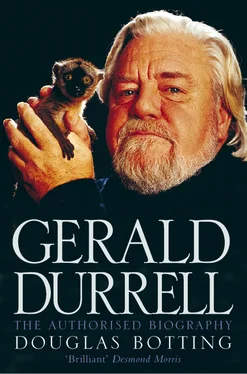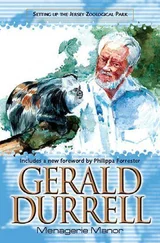The Durrell family were first surprised, then excited by Gerald’s ambitious plans. As far as they were concerned his life to date – for all his lively enthusiasm and quirky originality – had seemed about as unpromising as his brother Leslie’s.
During 1947 Gerald was increasingly drawn to London. The capital had many advantages for the intending expeditionary, including a world-class zoo and museums to visit, experts to consult, specialist dealers to advise about a legion of purchases, libraries to bone up in and bookshops to buy from. London also had, at that time, Peter Scott, the only son of Scott of the Antarctic, a war hero, portrait painter and successful painter of wildfowl who was already making a name for himself as a naturalist and pioneer conservationist in a world still largely oblivious of conservation and all it stood for.
Though there were a number of things Gerald did not have in common with Scott (background and personality being but two), they overlapped in two essential regards. Scott’s trail-blazing Wildfowl Trust at Slimbridge on the Severn marshes, which had been set up the previous year, was a model of the type of conservation establishment Gerald himself dreamed of founding one day. And Scott’s reverence for animal life was very close to Gerald’s own as yet unarticulated view. ‘My interest in the processes of evolution,’ Scott was to write, ‘has produced in me a kind of reverence for every species of flora and fauna, which have as much right to their place on earth as does homo sapiens . The prospect of extinction of any existing species then appears as a potential disaster which man’s conscience should urge him to avert.’ The destruction of nature and its living forms was, Scott felt, ‘a crime against an undefined but immutable law of the universe’.
Scott was living at the time in Edwardes Square, Kensington, and it is likely that the young Gerald Durrell went there to seek the advice of the older, more established professional. But though Gerald was a relative ingenu, Scott was aware that he already had enough clout to persuade John Yealland, Scott’s own first curator at Slimbridge, to go off to the wilds of the Cameroons with him.
Besides all its resources and experts, London also had women. Between the age of sixteen and twenty-two, a number of girls had drifted in and out of Gerald’s life. But though he was far from virginal, he was still a naïf in his relations with the opposite sex. This was now to change.
It was at lunch in a Greek restaurant in the West End, where he had gathered with Larry and a bunch of fawning failed poets, that Gerald met the woman who was to indoctrinate him into the deeper mysteries of love. He called her Juliet, but whether that was her real name may never be known. She was in her late twenties, six or seven years older than Gerald, married (but separated) with two young children. Gerald fell for her almost at once. She was not pretty, but she had a memorable face and beautiful eyes, and besides, she looked pale and sad, so that Gerald felt protective as well as drawn towards her.
‘What do you do?’ he asked.
‘I paint horses,’ she said.
Gerald had some problem with this. ‘I could not believe it – the mind boggled,’ he was to recall, ‘but surrounded by Greeks anything was possible.’
‘You mean you take a shire horse and a bucket of paint and accost him with it?’ he asked her.
‘No,’ she said. ‘I paint pictures of them – for their owners. Pedigree horses, of course.’
‘Of course,’ said Gerald gravely, adding tentatively: ‘Can I come and see your etchings some time?’
‘Yes,’ she replied. ‘How about tomorrow? Come and have lunch.’
So the tryst was made. Gerald caught a bus to Juliet’s, clutching a dozen gulls’ eggs for lunch in the hope that they would prove an efficacious aphrodisiac. Her house, he recalled, smelled of coffee and oil paints having a bath together. She showed him her paintings – ‘she wasn’t as good as Stubbs,’ he recalled, ‘but damned near it’ – and he stayed so long that they went out to dinner. Within a few days he had moved out of his Aunt Prue’s house in Drayton Gardens, Chelsea, which had been his base in town, and installed himself and his baggage at Juliet’s. ‘She was,’ he sighed with nostalgia for lost love, ‘the most wonderful woman in the world.’ ‘Juliet was Gerry’s first real affair, his first complete realisation of love and sex and all that,’ his sister Margaret remembered. ‘She really opened his eyes to it. Not that he saw much future to it.’
The affair lingered on and off for two years, punctuated by Gerald’s long absences abroad. He took it seriously enough to have thoughts of marrying the woman, which looking back he reckoned would have been a disaster. But there was no future to it. One morning he popped down to Bournemouth on some business or other and returned that evening to find a letter from Juliet waiting for him on the dressing table. It was, he recalled, ‘a note in the traditional manner, using all the trite phrases out of the novels we secretly enjoy but pretend are bad, like “we’re growing too fond of each other” and this sort of crap’. Distraught at this unexpected turn of events, Gerald got wildly drunk, and then cracked up. He had deeply cared for the woman after all. Eventually, in sadness and anger, he gathered his books together, packed his bags and sloped back to Aunt Prue’s with his tail between his legs. Not that it mattered much in the end. The wild world beckoned, and before long he would again be off to bigger and more challenging horizons.
In the meantime, Gerald concentrated on the real matter in hand. As the boxes of traps, guns, lanterns, socks, salt, suet, fish-hooks, maps, field guides and medicines began to clutter up the family home, word got about in Bournemouth that young Gerry, the former pet shop assistant and riding instructor, had turned into a naturalist and explorer, and was about to set off to Darkest Africa in search of pythons and apes. Earlier in the year his brother Lawrence had thought his career was tending in an entirely different direction, writing to Henry Miller from Rhodes: ‘My younger brother Gerry’s emerging as a poet. He is rather an iconoclast at present – feels he has to assert his individuality – thinks you a bad writer and me a terribly bad writer.’ In April 1947 Lawrence had to revise his opinion. After visiting Bournemouth with his new Egyptian wife Eve – the first time the whole family had been together since the Corfu days before the war – he wrote to Miller: ‘Gerald has turned out as a zoologist as he wanted and is leaving for Nigeria in September.’ Margaret, who now had two young sons, was soon to divorce her airman, Jack Breeze, and would use her legacy from her father to buy a large house across the road from Mother, while Leslie moved in with Doris Hall, a laughing, booming divorcee with a son of her own. Substantially older and bigger than Leslie, Doris still ran the off-licence half a mile down the road.
Gerald’s preparations were gathering momentum. At last the byzantine negotiations with the bureaucracies responsible for export, import, animal and gun licences were resolved. A cabin and cargo space were booked on a cargo vessel bound for Victoria in the Cameroons. Late in September 1947 Gerald collected a new passport. It described him as a zoologist, domiciled in Bournemouth, eyes blue, hair brown, and five feet seven in height.
Cargo ships are notoriously erratic when it comes to schedules. The boat on which Gerald hoped to sail was due to depart from London, and he stayed at Aunt Prue’s while he waited – interminably – for the boat to arrive. One day he happened to bump into Larry emerging from a bookshop carrying a large parcel of books.
Читать дальше










